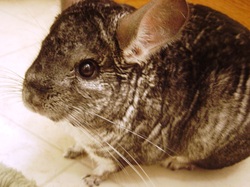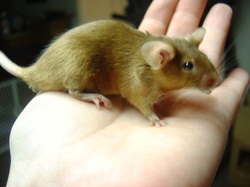| Judge's Park Small Animal Rescue |
|
Judge's Park Chinchilla Care

Dusty the chinchilla
Daily feeding:
-Unlimited timothy hay. Alfalfa can be given as a treat, but only rarely..
-1/8 cup of pellets a day, per Chin. Usually if the Chinchilla is getting unlimited timothy hay, we give them alfalfa pellets to balance everything out.
- Remove uneaten food after 24 hours.
-Recommended brands are Oxbow and Kaytee
-Do not go cheap with pellets; they are very important for nutrition. DO NOT buy pellets with nuts, seeds or fruits in them as they are very bad for Chinchillas.
-Water bottles should be refilled daily
-Our Chinchillas get the occasional treat of fresh veggies (very small pieces so they do not get diarrhea).
-They also love getting a piece of dried fruit (once a day), or specially formulated Chinchilla treat (we give our Chins only Oxbow brand treats as they are much healthier than other brands)
Cages:
-As large as possible plastic bottomed cage, preferably with multiple levels for climbing.
-Bedding should be aspen or unscented recycled newspaper (carefresh). Cedar and Pine should not be used, oils in them can poison a Chinchilla.
Playtime:
-Chinchillas require dust baths every 2-3 days. Get a good quality dust bath powder from the pet store.
- Chinchillas also benefit from being gently brushed with a slicker brush at least once a week.
-Always supervise them, especially around other pets and children
-Chinchillas can get stepped on and dropped very easily, which is possibly deadly.
-Always carry Chinchillas while supporting their rear and their front.
-Chinchillas like to chew, so always provide them with toys
-Example: Wood blocks (untreated and unpainted), cardboard tubes (as long as they can’t get their head stuck), hanging wooden bird toys, etc.
Vererinary Care
-Chinchillas only require vet visits if something is wrong. Lethargy, nasal discharge, and not eating are bad signs, which require vet care. Find a Chinchilla vet before something goes wrong so you have them on hand. (See our vets section)
-Unlimited timothy hay. Alfalfa can be given as a treat, but only rarely..
-1/8 cup of pellets a day, per Chin. Usually if the Chinchilla is getting unlimited timothy hay, we give them alfalfa pellets to balance everything out.
- Remove uneaten food after 24 hours.
-Recommended brands are Oxbow and Kaytee
-Do not go cheap with pellets; they are very important for nutrition. DO NOT buy pellets with nuts, seeds or fruits in them as they are very bad for Chinchillas.
-Water bottles should be refilled daily
-Our Chinchillas get the occasional treat of fresh veggies (very small pieces so they do not get diarrhea).
-They also love getting a piece of dried fruit (once a day), or specially formulated Chinchilla treat (we give our Chins only Oxbow brand treats as they are much healthier than other brands)
Cages:
-As large as possible plastic bottomed cage, preferably with multiple levels for climbing.
-Bedding should be aspen or unscented recycled newspaper (carefresh). Cedar and Pine should not be used, oils in them can poison a Chinchilla.
Playtime:
-Chinchillas require dust baths every 2-3 days. Get a good quality dust bath powder from the pet store.
- Chinchillas also benefit from being gently brushed with a slicker brush at least once a week.
-Always supervise them, especially around other pets and children
-Chinchillas can get stepped on and dropped very easily, which is possibly deadly.
-Always carry Chinchillas while supporting their rear and their front.
-Chinchillas like to chew, so always provide them with toys
-Example: Wood blocks (untreated and unpainted), cardboard tubes (as long as they can’t get their head stuck), hanging wooden bird toys, etc.
Vererinary Care
-Chinchillas only require vet visits if something is wrong. Lethargy, nasal discharge, and not eating are bad signs, which require vet care. Find a Chinchilla vet before something goes wrong so you have them on hand. (See our vets section)
Judge's Park Mouse Care

Buster the mouse
Feeding:
-Mice must always have access to good quality rat/mouse block
-Recommended brands are Harlan (Native Earth), Sunseed, and Oxbow
-The main ingredient should not be corn!!
-Only give them specially formulated mouse food. It is better for their
dietary needs.
-Along with the block, we give seed mixes to our mice
- Recommended brands are Kaytee or Mazuri
-Mice should have access to water at all times.
-Veggies and fruits are good additions to a mouse's diet (sweet foods only occasionally)
- Broccoli, peas, green beans, carrots, tomatoes, bananas, cherries, celery, cucumber, apples (seeds removed), etc.
-People food can be fed as well, i.e. wheat pasta (cooked or uncooked), cereal (especially cheerios!), small amounts of cheese, cooked meat, yogurt, oats, etc.
-Avoid orange peels, chocolate, very sugary foods, and anything that is unhealthy (processed foods are a no).
Housing:
-Mice should be in a large as possible plastic bottomed cage or aquarium: the larger the better
-If there is wire bottom shelving, try and cover it up with paper towels or newspaper so they don’t get foot problems
-Bedding should be Aspen or recycled paper (Carefresh, Yesterdays News).
-NEVER use Cedar, Pine, or any sort of cat litter (all poisonous)
-Always provide toys, i.e. chew tubes, cardboard (paper towel or toilet paper rolls), things to shred, newspapers, and wood chews for them to wear their teeth down
Always watch for upper respiratory issues, lethargy, or rejection of food. These could indicate a serious problem, and a vet should be seen.
-Mice must always have access to good quality rat/mouse block
-Recommended brands are Harlan (Native Earth), Sunseed, and Oxbow
-The main ingredient should not be corn!!
-Only give them specially formulated mouse food. It is better for their
dietary needs.
-Along with the block, we give seed mixes to our mice
- Recommended brands are Kaytee or Mazuri
-Mice should have access to water at all times.
-Veggies and fruits are good additions to a mouse's diet (sweet foods only occasionally)
- Broccoli, peas, green beans, carrots, tomatoes, bananas, cherries, celery, cucumber, apples (seeds removed), etc.
-People food can be fed as well, i.e. wheat pasta (cooked or uncooked), cereal (especially cheerios!), small amounts of cheese, cooked meat, yogurt, oats, etc.
-Avoid orange peels, chocolate, very sugary foods, and anything that is unhealthy (processed foods are a no).
Housing:
-Mice should be in a large as possible plastic bottomed cage or aquarium: the larger the better
-If there is wire bottom shelving, try and cover it up with paper towels or newspaper so they don’t get foot problems
-Bedding should be Aspen or recycled paper (Carefresh, Yesterdays News).
-NEVER use Cedar, Pine, or any sort of cat litter (all poisonous)
-Always provide toys, i.e. chew tubes, cardboard (paper towel or toilet paper rolls), things to shred, newspapers, and wood chews for them to wear their teeth down
Always watch for upper respiratory issues, lethargy, or rejection of food. These could indicate a serious problem, and a vet should be seen.